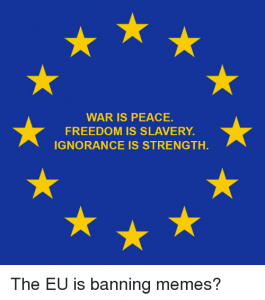Looking in from Germany Nemanja Rujevic gives his views and opinion on Brexit.
DW’s Nemanja Rujevic wonders, why all the panic over Brexit?
Listening to EU media and politicians, one might think that the British will be washed into the Atlantic in a biblical flood once they leave the bloc.

Recently, a German television station presented its viewers with the story of a desperate mother in London who believes the medicine that her daughter with a severe disability needs will be unavailable when Britain leaves the European Union. A crying mother is a great hook, and, with a little talent, journalists can use such an image to produce a compelling report. At the end of this particular segment, viewers saw the woman again: vowing that she would leave the United Kingdom to provide her daughter with proper health care.
It’s no surprise that, the closer Brexit gets, the more we hear about it. Barely an aspect of Britain’s approaching secession from the European Union has gone uncovered in this endless succession of analyses, commentaries and reports. But, after three ceaseless years of Brexit stories from media outlets in Germany and elsewhere, you might get the impression that the issue is less about a country’s leaving the EU than it is about the Four Horsemen of the Apocalypse fixing to gallop across the United Kingdom.
Could Britain be swallowed up by the Atlantic? One might think so judging by the number of reports that predict that the United Kingdom will not only face medical shortages, but also economic hardship, the destruction of London, famine, isolation and a devastating civil war.
Some “experts” interviewed by media are preppers: people who stock up on water, pasta and canned food in order to survive catastrophes such as an alien invasion or, in this case, Brexit. Normally, mainstream media would portray such people as a bit strange at the very least. But, with Brexit fast approaching, preppers have become sought out commentators whose fears need to be taken seriously.
More serious indicators suggest that these end-of-the-world scenarios will not come to pass: The labor market is booming, wages are rising, and unemployment is at its lowest since 1975. And all of that is “despite Brexit,” according to German media — which would never report that it was “because of Brexit.”
Why are the macroeconomic numbers that the media otherwise fetishism being ignored in this case?
Of course, Brexit is “rattling” markets — but anyone who pays attention to the markets for a while will soon realise that investors are always rattled by something, and yet, miraculously, they also always manage to increase their wealth.

Thou shalt remain
All of the pessimistic predictions follow another logic, however, one that is propagated by Brussels and Berlin: Whoever dares to leave the European Union will — indeed, must — suffer.
The goal here is to strike fear into the hearts of those who seek to destroy this unparalleled historic project of reconciliation and close economic cooperation. Holding the EU together is a legitimate political aim, especially now, as euroskeptics and nationalists are gaining ground across the bloc.
The threats are reminiscent of the promises the European Union made before the independence referendums in Scotland and Catalonia. Both of those economically and democratically advanced regions were also the target of apocalyptic predictions. Then, too, Brussels threatened that if voters were to choose independence, they would not be allowed to remain in the EU or adopt the euro as their currency.
And now Britons are portrayed as self-destructive oddballs, and often — at least the voters who narrowly tipped the referendum in June 2016 — as gullible for believing the fairy tales spun by the Leave campaign. But are the end-of-days stories that we hear from the media and politicians now really better than the lies told by Nigel Farage were then?
It may sound naive, but the chaos of Brexit will be behind us sooner than we think.
The Channel won’t get any deeper. Soon, Britain will just seem like another Norway or Iceland. And, no, desperate mothers won’t have any trouble getting medication for their children in London.
Article and Opinion by DW’s Nemanja Rujevic

Support Independent Journalism Today
Our unwavering dedication is to provide you with unbiased news, diverse perspectives, and insightful opinions. We're on a mission to ensure that those in positions of power are held accountable for their actions, but we can't do it alone. Labour Heartlands is primarily funded by me, Paul Knaggs, and by the generous contributions of readers like you. Your donations keep us going and help us uphold the principles of independent journalism. Join us in our quest for truth, transparency, and accountability – donate today and be a part of our mission!
Like everyone else, we're facing challenges, and we need your help to stay online and continue providing crucial journalism. Every contribution, no matter how small, goes a long way in helping us thrive. By becoming one of our donors, you become a vital part of our mission to uncover the truth and uphold the values of democracy.
While we maintain our independence from political affiliations, we stand united against corruption, injustice, and the erosion of free speech, truth, and democracy. We believe in the power of accurate information in a democracy, and we consider facts non-negotiable.
Your support, no matter the amount, can make a significant impact. Together, we can make a difference and continue our journey toward a more informed and just society.
Thank you for supporting Labour Heartlands









